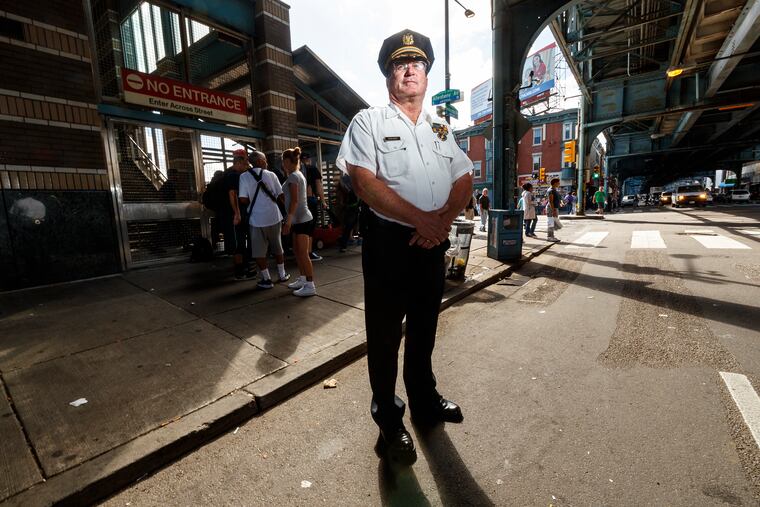As opioids ravaged Kensington, a career cop learned how to police a crisis | Mike Newall
The opioid epidemic touches everything, changes everything, including the career of a veteran cop in Kensington.

The police inspector had seen people shot and die. Ray Convery had worked all over Philadelphia in 35 years on the job — there wasn't much he hadn't seen. But until he assumed command of East Division in 2016, he'd never seen someone dying of an overdose.
It is a sight as familiar in Kensington as the El rumbling by. For Convery, it came two weeks in: a young woman outside the Gurney Street train gulch, her skin fading. Convery was by himself. Back then, he had no Narcan. The wait for the paramedics felt like hours.
"Just watching someone fade away," he said, "when you know there's something to fix them."
The woman survived. A few weeks later, after he came across another overdose, Convery started packing Narcan in his patrol car. He's since saved five people himself.
That day by the train gulch was Convery's first lesson in a crisis: The epidemic touches everything, changes everything. Librarians dispense Narcan to patrons. SEPTA passengers have learned how to recognize an overdose, and how to help the first responders who show up. And now Convery's job description includes figuring out how to put his officers in the best position to reverse overdoses.
In the next few weeks, Convery, 59, who has been praised by city officials, advocates, and neighbors as someone who's taken the lessons of the crisis to heart, is retiring, to take a job working with the police union's health-care provider.
Replacing him will be difficult, said Commissioner Richard Ross. Kensington, he said, presents a singular set of challenges: It doesn't just have the city's highest poverty rates, or skyrocketing homelessness, or among the highest rates of gun violence. It has all those things. Plus it's the epicenter of the country's urban opioid crisis.
Convery has come to realize that the crisis is bigger than deploying more patrol cars, bigger than targeting drug corners, bigger than policing itself.
Two years in Kensington will do that. He's learned to measure success in small victories, like clearing a block of drug dealers for more than 15 minutes. Like reclaiming "the jewel" of the neighborhood, McPherson Square, as a place where kids can play.
That's what encouragement you have to take, in the face of the paperwork that piles up on his desk. A flood of more than 700 homeless people in East Division alone — "Incredible," Ross says — almost all of them addicted. That's half the city's homeless population, and more than double what it was last year. A new shorthand exists: Convery refers to the heroin encampments as being "at capacity."
And then there are the things that don't show up in the reports: how the young people Convery meets can become unrecognizable after just a few weeks on the streets. How the police catalog the drug activity along the west side of the avenue, a market so large it swallows one block after another. "We call it 'The 3100 Block of Everything,' " said Convery. And now, with the growing crowds, there's a matching stretch on the east side — that's The 1800 Block of Everything.
Convery knows the pain of the neighbors in Kensington — helping neighborhood kids get to school safely, without stepping over people doing drugs, is nonnegotiable, he says. And he is still arresting corner dealers — to "send a message" — though advocates argue that going after street-level sales is just continuing failed policies from the war on drugs.
But he also recognizes that the people on the streets are his responsibility, too. He calls them all residents — just "ones that have houses, and ones that don't." It's one more lesson that his successor would do well to follow.
During Convery's last few days in command, the city declared a disaster in Kensington — a move that he hopes will bring more resources to all its residents. But he doesn't like to call the neighborhood a disaster. He calls it a challenge. One that he still thinks can be fixed. It's just going to take far more than policing.